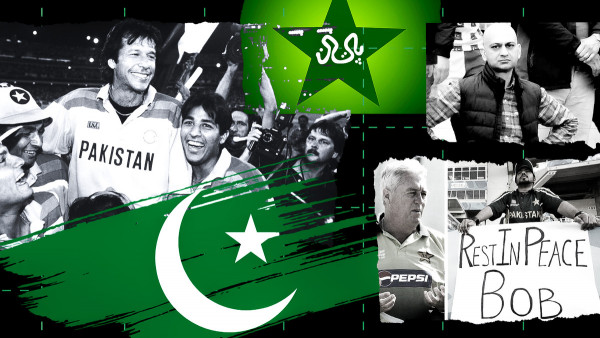In Pakistan, the revolving door of cricket and politics is almost always in motion, writes Benjamin Ashraf [photo credit: Lucie Wimetz/TNA]
If pets look like their owners, the Pakistan cricket team must resemble an anarcho-state.
A Molotov cocktail of post-colonial pride and nuclear-armed rivalry, supporting Pakistan is not for the faint-hearted.
Just ask former World Cup-winning captain and playboy-turned-Prime Minister Imran Khan who sits in jail, coach Bob Woolmer who died under suspicious circumstances after losing a match, or the Sri Lankan cricket team caught in deadly crossfire while training in Gaddafi Stadium, named in honour of the Libyan dictator after he endorsed Pakistan’s pursuit of nuclear weapons in 1972.
Yet the sporting gods continue to renew the soap opera that is Pakistani cricket. It’s just as well the country was forged along religious fault lines; fandom requires near-monastic patience.
We’ve had our fair share of highs; lord knows we’ve had our lows. The double defeat to the United States, minnows made up of software engineers fleeing the subcontinent, and arch-rivals India — in which Pakistan snatched defeat from the jaws of victory — are the latest results that’s left the public bemused.
The post-mortem of Pakistan’s premature exit has been damning: boycotts, death threats, the lot. But with the dust starting to settle, and yet another shock absorbed, it’s time they assumed the mantle as the most volatile outfit in sport.
Pakistan and the psyche of the cornered tiger
Frenzied as we are fickle, Pakistani cricket fans are nonetheless a hardened breed.
Endless off-field drama, a decade-long exile, and a spot-fixing scandal have played out amid the ‘War on Terror’ and an ill-fated if enduring marriage between successive civilian governments and an overbearing military.
The country and its cricket team can’t seem to catch a break. Constant vilification in the media hasn’t helped. Nor have the shifting sands of a sport that’s seen Pakistan’s conjoined twin — and sworn enemy — India enjoy a monopoly and thus spite their involvement where possible.
But, as Pakistanis themselves will tell you, the blame game is too often the default in a country on the verge of collapse.
The outlook in 2024 doesn’t look good however you dress it. An import-led and remittent-reliant economy flirts, again, with an IMF bailout which even China’s Belt and Road Initiative will struggle to fix. Meanwhile, the military-mujahid experiment has backfired with monthly, if not weekly consequences.
Pakistan has pawned its future without a receipt, even if its entrenched elite tells you otherwise.
The Pakistan People’s Party (PPP) and the Muslim League’s (PLMN) feudal chokehold — refashioned as ‘stability’ — and the economy’s chronic reliance on China, Saudi Arabia, and the United States — modelled as ‘pragmatic’ — are but two examples of doublethink that’d make Big Brother scoff with glee.
It’s within this less-than-stable status quo that lies Pakistan cricket. Mercurial at the best of times, the team has nonetheless gifted us moments of great pride, with World Cup wins in 1992 and 2009 and a Champions Trophy in 2017 now fables in the country’s chequered 77-year history.
Politicians know this, though, and find cynical ways to exploit it.
More than a game
The best example of the link between cricket and politics — and the Oscar Wilde quote “Life imitates art more than art imitates life” — was the 2024 elections.
Penned in his Rawalpindi jail cell and broadcast via AI, ex-Prime Minister Imran Khan summoned every ounce of cricket-playing glory in his campaign speeches, calling on Tehreek-e-Insaf (PTI) voters to fight like “cornered tigers” just as he’d done in taking Pakistan to their storied 1992 World Cup win.
Back then Khan’s opponents were Australia, 32 years later it’s his own country’s military-political establishment — and it very nearly worked.
Despite the incumbent PPP-PLMN coalition blocking Khan’s PTI from standing in the election, Khan’s use of, you guessed it, a cricket bat as an election symbol — needed in areas of low literacy — helped galvanise PTI-turned-independent candidates into near-folkloric success.
It certainly ruffled the coalition’s feathers; they banned the cricket bat symbol not once, but twice. And were it not for their last-ditch attempts, Imran Khan could have won, such is the sway of the willow in the subcontinent.
Now the revolving door between cricket and politics is almost always in motion, with each taking inspiration from the other.
The Pakistan Cricket Board has mimicked the state’s bloated bureaucracy — 2,200 out of the 2,800 the country’s registered clubs are “ghost clubs” — and team selection mirrors the favouritism rife across society.
For their part, politicians weaponise the cricket’s team status, describing major wins as “victories for Islam”.
Written during the height of the West Indies independence struggle, C.L.R James’ Beyond a Boundary asks: “What do they know of cricket, of what only cricket knows.”
A revision of Rudyard Kipling’s boast “What should they know of England, of what only England know”, C.L.R expresses cricket as an extension of British colonialism and thus a defining feature of West Indian history and culture.
In Pakistan, the Trinidadian Marxist has another textbook example. And given the team’s World Cup exit ending on the technicality — or divine intervention — of a washed-out pitch, perhaps C.L.R James’ question should instead be: “What do they know of Pakistan, of what only God knows.”
Benjamin Ashraf is The New Arab’s Acting Opinions Editor. He is also a Visiting Research Fellow at the University of Jordan’s Center for Strategic Studies.
Follow him on X: @ashrafzeneca
Have questions or comments? Email us at: editorial-english@newarab.com
Opinions expressed in this article remain those of the author and do not necessarily represent those of The New Arab, its editorial board or staff.


